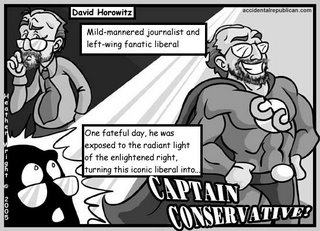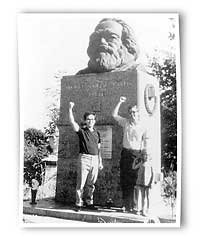
 [David Horowitz recruiting children to communism in the 60s]
[David Horowitz recruiting children to communism in the 60s]So . . . it seems that David Horowitz is coming to my campus, Penn State University, as part of the tour in support of his pseudo book on the American academy. Thought I’d do a little bit of preview work, so I watched the video of his recent appearance at Duke (pre-Lacrosse team fiasco) on C-Span’s book TV, and I checked out the book itself. I thought it only fair that I spend at least as much time reading Horowitz’s volume as he devoted to reading the works of each of the professors he profiles in his book, so I strolled over to the campus bookstore and spent about five minutes thumbing my way listlessly through one of the many copies on display. Unless you're a very slow study, you'll be able to inhale this well-spaced text as easily as a twenty-year-old with twenty-twenty vision reading a large print edition.
The most immediately striking thing is the sheer oddness of the selection of professors for inclusion in the book. There are several of the people you might expect to find as objects of attack by any right thinking right winger – people like, say, Amiri Baraka. Though Baraka’s inclusion is itself a sort of oddity, given that he retired from being a professor many years before this book was even thought of. Maybe the book should have been titled "The Professors, and Emeriti." But believe me, you tenured radicals will be surprised to find several people you never heard of on this list.
(OOPS! I forgot how exercised Horowitz is when people refer to his "list." In the course of the Duke appearance, he brandished the volume for the camera and the audience, as if to underscore how foolish it would be for anyone to confuse a "book" with a "list." Still, I have to say, if you publish a series of short entries organized in alphabetical order, you probably should expect some readers to think you’ve published a list. Horowitz has a thing about lists. During the Duke talk he claimed several times that there is a "blacklist" passed among campus lefties to enforce a ban on conservatives. In a conversation with journalist Bill Steigerwald that appeared in our local paper, the Centre Daily Times, on Monday, Horowitz claimed that campus radicals have "introduced a blacklist that has excluded conservatives, libertarians and believing Christians." [Note the peculiarity of that construction. It seems to imply that the many Christians I’ve met on campuses are somehow not "believing" Christians. Lord knows what he’d make of a Flannery O’Connor or a Graham Greene, both of whom we teach all the time in departments of English.] Later in the piece, Horowitz describes this as "the longest, most extensive blacklist in the history of America." Come to think of it, during the McCarthy era, when there really was a blacklist, it was published in book form for ready reference.)
One thing you’ll spot right away is that professors with names that appear to have origins in the Middle East are represented out of all proportion to their actual numbers in academia. What do you suppose that is all about?
In the end, though, it appears (at least from my five minute review) that the majority of the professors in the book made the list by virtue of having pissed off the individuals who are listed at the end of nearly every entry as having done the actual research. Horowitz works outside the academy, so it may be that he simply doesn’t understand that one should in fact read the works that your researchers have researched.
And this probably explains, for those of you who have been wondering, why you aren’t in the book. At the Duke talk, he responded to the first person to get to the mic during the Q & A, who asked him why she wasn’t in the book, by saying she probably wasn’t intelligent enough. Don’t know quite how he reached that judgement without knowing a bit more about the questioner, but then it appears, from the book, that he isn’t the sort to allow a lack of familiarity with someone’s texts to stand in the way of his making judgements about their merits.
In the absence of real reading, Horowitz simply repeats the same things over and over again. At Duke he claimed several times that the faculty there only work five hours a week. In the Centre Daily Times interview, he attacks Diane Nelson, claiming that she is paid for "six hours a week in class," despite the fact that he had just mentioned her position as Director of Undergraduate Studies for her department. (Horowitz, who is reticent on the subject of the funding for his activities, is quick to publish the salaries of the profs he targets, which is how I now know that Nelson makes about what I make – thanks, Penn State!)
Similarly, Horowitz repeatedly insists that the professors he profiles "are promoted beyond their scholarly output," as he put it in the Steigerwald interview. At Duke he claimed that Cornel West, for example, had not published a scholarly article in twenty years, a claim it only took me about thirty seconds of googling to see was a falsehood. By way of comparison, last time I checked on Shelby Steele, of Stanford’s Hoover Institute, he hadn’t published a peer reviewed essay in his field since the seventies. The "Blacklist" didn’t prevent Steele from holding a tenured full professorship at San Jose State back in the years when I knew him, and I know he was glad that Stanford’s Hoover Institution took him away from that 4/4 teaching load we had there. I don’t know how much he gets paid in his current position, but I know he teaches zero classes per week, and thus, if we followed Horowitz in his foolishness, might be said not to be working at all. Please weigh that conditional tense – I would never say that Shelby Steele does no work.
There is so much silliness in Horowitz’s diatribes that one hardly knows which piece of the madness to grab hold of. In the Centre Daily Times piece he says that the recruitment centers for the radical left usually "end in ‘studies’: women’s studies, black studies, religious studies – one of the worst fields in the country – whiteness studies, queer studies, global studies, cultural studies, all different forms of Marxism and various derivative radical doctrines." That’s right, religious studies! God knows we need to put a stop to all those Marxists over there studying Marxism under the guise of trying to understand Buddhism and Zoroastrianism, keeping believing Christians away from the study of Biblical textual, yes, STUDIES, by means of the fiendishly invisible blacklist.
Elsewhere in the Q & A, Horowitz claims that all the professors in his book "believe in some version of Marxism, though they call it feminism, post-structuralism, postmodernism." Guess all those academic leftists who have mounted attacks on postmodernism just weren’t sufficiently intelligent enough to see that it is simply another form of Marxism, albeit perhaps a non-totalizing, non-teleological, anti-foundationalist Marxism.
My Penn State colleague Michael Bérubé, who does appear in Horowitz’s listbook, points out in a response that also appeared in Monday’s Centre Daily Times that Horowitz (or his researchers) had attributed to Eric Foner a passage that Foner never wrote. Here Horowitz falls back on a tactic no professor of any political persuasion would accept from a student: "it was my intention to cite the authentic quote." The errors of Horowitz and his allies are somehow always excused as "inconsequential," and Horowitz mounts a similar defense of the more extreme bigotries expressed by some on the right. When one of the more thoughtful students to approach the mic after the Duke talk tried to raise this inconsistency with Horowitz, he was met with withering deprecation. Picking up on Horowitz’s several appeals to the idea of civility in the face of his detractors at Duke, the student attempted to engage Horowitz in a colloquy about the civility of the right, using the example of Ann Coulter’s use of such racist epithets as "rag heads" and "camel jockeys." This seemed to provoke Horowitz no end. He declared Coulter to be a great American satirist, then shut the student down, blustering that he would not countenance these attacks on Ann Coulter.
I imagine we should expect much the same from Horowitz’s Penn State talk. At Duke, he began, curiously enough, by denouncing all the departments and programs that had not contributed to his rather large speaker’s fee and expenses. Hey, I know how he feels. Despite a fairly impressive output of innovative scholarship, I haven’t gotten a paid speaking engagement out of Duke’s Department of Literature either. Their College Republicans, too, seem mysteriously impervious to my charms, but I remain ready to come to speak to them for 1/3 of what Horowitz was paid. Y’all listening out there, Duke?
Horowitz went on to make much of several imaginary Duke lectures. He speculated on the contrasting levels of support that would have been made available to speakers who aren’t David Horowitz. He seemed to think that Dr. Sami Al-Arian could have been expected to be treated regally at Duke, though, as Horowitz chortled, Al-Arian was presently in jail. The passage of time stole some of the rhetorical efficacy from that line, though, as a jury of American citizens in Florida had in the mean time refused to convict Al-Arian of the crime he was charged with. Horowitz took after Harry Belafonte, too, but with a spectacularly strange moment as Horowitz conceded, having just denounced something Belafonte was supposed to have said, that "I guess he didn’t say this when he was at Duke."
I don’t know how much Horowitz will be paid at Penn State. I suspect it would be enough to fund the teaching of a much-needed undergraduate English course, or, as Horowitz likes to portray our work, an opportunity for "recruiting children for communist causes." (Children? Do his student sponsors have any idea what he seems to think of them?)
Still, in the interests of fuller debate, I encourage everybody to read David Horowitz’s book. Stroll over to the book store during one of those many leisure hours Horowitz is certain you have. Pick up a copy of his volume and read it there in the store. I assure you, it won’t take long.





















1 comment:
Dear Aldon: Send me your e-mail address and I'll send you what I wrote about Horowitz when he visited my school. I liked your approach better -- I was a bit more didactic. BUt, every little bit helps.
Mike
mameerop@wnec.edu
Post a Comment